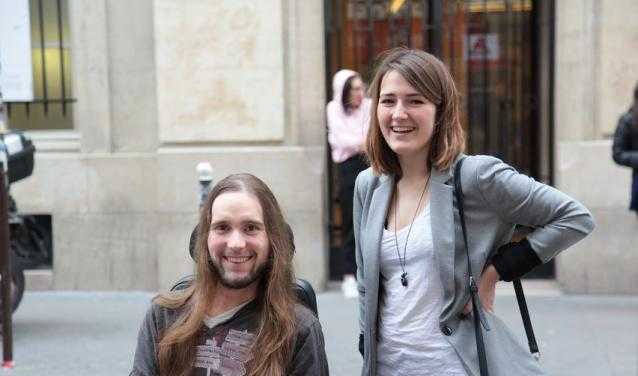Home>"There are a lot more geeks at Sciences Po that you might think"

01.09.2016
"There are a lot more geeks at Sciences Po that you might think"
Espace Numérique is an association of Sciences Po students keen to promote digital culture. Their website is full of computer tips and articles about the Internet and social networks. We met two members of the association, Alexia Toulmet and Tom Bry-Chevalier.
Your association organises all kinds of events, from a Mario Kart tournament to a conference entitled "Is transhumanism a form of humanism?" at Sciences Po. How would you define your mission?
Tom Bry-Chevalier: Our goal is to promote digital culture at Sciences Po. We bring together a whole online community, particularly around fun things like video games. We also organise several events throughout the year to show digital culture from a different angle.
Alexia Toulmet: We also offer a free computer cleaning and troubleshooting service for students with a helpdesk we run four hours a week. Moreover, to run this service and the whole association we need volunteers, so we appeal to anyone who reads this article and is interested to get in touch [laughs].
You posted an article on your website about the stereotypes associated with "geeks" [from the German "geck" meaning "crazy"]. Is it possible to be a geek and a student at Sciences Po?
A.T.: Of course! [laughs] There are a lot more geeks at Sciences Po that you might think. It's getting easier to be open about it. We've noticed that during the video game tournaments we organise some students really let their geek side take over. Whatever their political affiliation or their dress style, they play together. It's a form of diversity.
T. B.C.: It's also important to note that Espace Numérique has a lot of female members, it's a completely coed association. And those members don't necessarily play "girls' games", but more often MMORPGs [Massively multiplayer online role-playing games] like World of Warcraft.
Do some video games echo what you study in your courses?
T. B.C.: Yes, video games are extremely varied and you can find political simulation games, games with a historical focus or about complex economic systems. For example, Europa Universalis is a game of historical strategy where the player has to lead a European state from 1444 to 1821 and take into account the geo-political situation. I found a lot of connections between this game and a course I took at Sciences Po on the Ottoman Empire.
A.T.: There's also This War of Mine: The Little Ones. It's a game in which the player follows a small group of civilians during a war.
Are you among those who consider video games to be works of art?
T. B.C.: In my opinion not all video games are works of art.
A.T.: Video games should not be seen only as amusement, they are very finely-worked. Some games like Child of Light have a really poetic atmosphere.
T. B.C.: This year at the Musée d'art ludique in Paris there was a show about art in video games. We don't always realise it, but video games are a complete art form that draws on almost all other types of art. Film, drawing and music are the most obvious because they create the audio-visual universe of a game; but architecture is also central to some games, and you could almost see the movement of certain characters as dancing.
You would like to develop outside Sciences Po so that as many Internet users as possible can benefit from the content of your website. Do you think that digital culture is not as highly regarded as it should be?
A.T.: I think it's getting better and better, that digital culture is increasingly well known and widespread, but there is still work to do. Digital technology is not just a bunch of geeks, it is a very important part of the economy. More and more Sciences Po students work in digital startups. And it is clear that within Sciences Po, efforts are being made by the administration to ensure students can master digital tools and culture more easily.
Are there any games, interactive movies or reading you would recommend for those who want to learn more about digital culture?
T. B.C.: Fire Emblem is a tactical role-playing game that I think would appeal to Sciences Po students.
A.T.: You can also find out about video game culture without playing, by watching other gamers play on a streaming platform, like Twitch for example [a live streaming and VOD platform for video gaming]
T. B.C.: There are a lot of books too, particularly on transhumanism.
A.T.: And a lot of books are part of geek culture, from The Lord of the Rings to the books of Isaac Asimof to The Hitchhiker's Guide to the Galaxy.
Related links